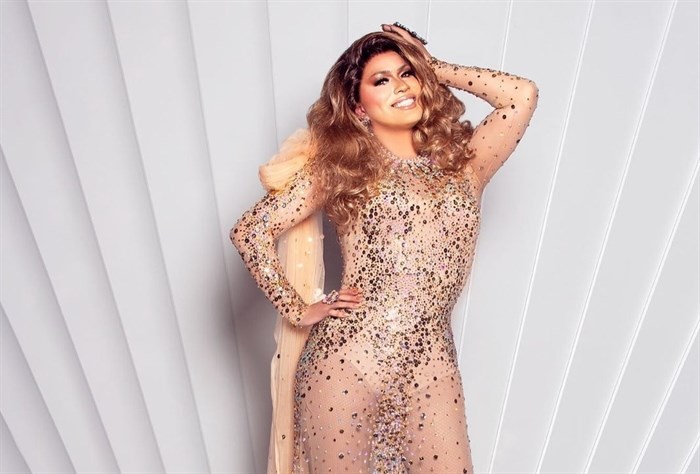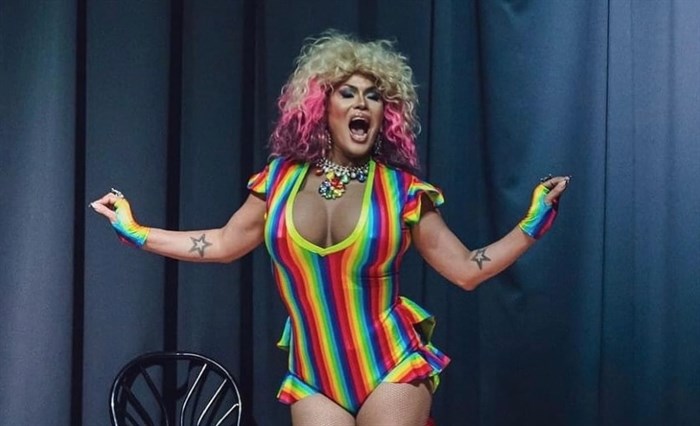
Ella Lamoureux is and Two-Spirit Kelowna Drag Queen.
Image Credit: Ella Lamoureux
October 15, 2023 - 7:00 PM
Ella Lamoureux is a prominent figure in the Kelowna drag scene. She is also an important voice for Indigiqueer and Two-Spirit identities.
According to the Indian Health Service, the term Two-Spirit refers to Indigenous peoples who were considered neither men nor women and occupied a distinct, alternative gender status and specialized work role within the community.
Ella is otherwise known as Dustin Dufault or by his Indigenous name Dyhekia, meaning “the wanderer”. Dyhekia has identified as Two-Spirit for more than ten years, but said he has always known he was different.
“I did know that I was different because I was more feminine than everyone else,” he told iNFOnews.ca. “We would come into town for Halloween, and I remember wanting to be a princess and my mother, being the fantastic person she was, sewed me a dress.”
Dyhekia grew up in the Yukon territory and experienced a remote, off-grid upbringing.
“We lived in a cabin that my father built with no running water, no electricity. We survived off the land, trapped throughout the winter. I even had my own little rabbit trap line around the cabin that I would check every morning,” he said. “I just thought that was a normal way to live until we moved south and then everyone had like these houses… Now, thinking back on it, I was like, you know, that was a very, very good upbringing.”
During his youth, Dyhekia said that queerness was discouraged but he's not sure when that developed or how.
“Queerness in the Indigenous world is quite frowned upon, even though it was seen as a place of honour back in the day,” he said. “I feel that all these people went into the residential schools, got indoctrinated, saying that queerness is bad, but also a lot of people got sexually abused."
While he lived in the Yukon, Dyhekia said he felt unsafe to reveal the feminine side of his personality outside of his family.
“When you're in northern communities and in these smaller isolated ones, it's very violent and very aggressive and you run the risk of getting beaten to death,” he said. “So there was the fear of growing up and knowing that I was different and keeping it quiet. But thankfully, I had a mother that was very supportive and let me do little things inside the house. Like I'd play with Barbies with my sister and I'd sew clothes for her Barbies. And they never forced me to go outside and play with like trucks and things like that.”
Dyhekia uses both male and female pronouns and said that gender has always been something he questioned.
“I never understood why non-animated objects were gendered. So I purposely misgendered things,” he said. “And then I got older, and I was like, look at me being a little activist when I was just a 14-year-old boy not knowing it. So I've never cared about pronouns my entire life.”
Dyhekia was first introduced to drag as a young child, when he watched the film ‘To Wong Fu’.
“I thought it was pretty fantastic,” he said. “I loved the idea of it.”
It was only later in life, when he moved to Calgary, that he was introduced to live drag performances and Indigenous drag queens.
“The first performer I saw was this person called Argentina Haley, who is also an indigenous drag artist. And she did this Tina Turner number and I was just so enthralled with it. I thought it was like the most amazing thing I've ever seen in my life,” he said. “I repressed the idea of wanting to do drag because it was too girly. And I just kept going to drag shows because I loved it, loved it, loved it.”
It wasn’t until he moved to Kelowna that Dyhekia tried drag himself and found connection.
“Express(ing) myself the way I wanted really helped me to come to terms with the shame I had with expressing femininity,” he said. “My drag helped me come to terms with my cultural identity because I pushed it to the back for a bit. Because it was easier to be in a white world than be in a native world because whites got more accepted in this country. So I pushed aside as much of my Indigeneity as I could to try to fit in, and it worked.”
“But then when I got older. I realized that that was a really messed up way to live and I started fighting back with it,” he said. “I was like, how dare this world make me feel like I have to push aside a whole part of my life just to fit in and have things easier... I became like a very angry Indigenous person fighting back, being loud, which is great.”

Ella Lamoureux is a Two-Spirit drag performer based in Kelowna.
Image Credit: Ella Lamoureux
During this time of reconnecting with his Indigenous identity, Dyhekia also came across the term Two-Spirit.
According to The Indigenous Foundation, although non-conforming gender identities existed historically in many First Nations cultures, the term Two-Spirit was coined in a conference in Winnipeg in 1990. Elder Myra Laramee put forth the term as a translation of the Anishnaabemowin term, "niizh manidoowag", meaning “two spirits”.
“I didn't hear about it until the mid 2000s when I claimed it for myself,” Dyhekia said. “I was like, this is such a beautiful word… So, I learned more about it, did some research, realized that it does mean that you can have a feminine and masculine spirit in one…. And it just lets you express yourself in so many ways.”
Dyhekia said during this time he learned the significance of Two Spirit individuals in Indigenous cultures.
“The reason why it's such a place of honour is because you're able to go into each realm and understand more. And that's usually the reason why Two Spirit people were either medicine men, matchmakers, storytellers, history keepers, because they're able to see both sides of the coin, essentially,” he said.
Although the term is non-conforming to gender norms, it does differ from other LGBTQ+ identities.
“There is crossover because Two-Spirit is an umbrella term for all Indigenous queer people. You don't need to be trans, you don't need to be non-binary, you don't need to just be queer or gay or lesbian. It's just an umbrella term for all Indigenous queer people,” Dyhekia said. “I always tell some people just because someone's Indigenous and queer does not mean that they're Two-Spirit. They have to say that they are so then you can call them that way.”
“A lot of people do ask me all the time… ‘I like the term Two-Spirit. Can I be that?’ I was like, no, no, no. The reason why Indigenous people came up with this term is because they wanted to separate themselves from colonization,” he said.
Despite some misunderstandings about what the term Two-Spirit is, Dyhekia said more people are becoming familiar with the identity in BC.
“What's nice with the world now is that when I took the title on over 10 years ago, I spent the majority of my time explaining my identity to people because no one knew what it was. I had to constantly explain," he said. "And what's nice within the last three or four years is that I don't have to anymore... The majority of the time, I can say I'm Two-Spirit and people get it. I may have to clarify a couple of things, but it's not the same as starting at base point like it was 10 years ago.”
Despite shifting opinions, the current political climate still makes Dyhekia apprehensive about how Indigenous queerness is perceived by the public.
“I have hope that there's hope,” he said. “But it's disconcerting sometimes when you look around and you just see like this obvious spouted hate.”
The best way to combat this and show support for Indigenous queer people is by informing yourself and being present, Dyhekia said.
“I just tell people to be present. If there is a march, show up. I'm like, you don't have to engage in them. You're just showing up. You're showing numbers. We just have to show that we're still here because they're getting very, very bold. And it's getting terrifying for a lot of queer people and especially Indigenous queer people as well.”
“Just take the moment to look it up online. I know Wikipedia isn't always a great source, but it has some great information in there. I don't feel that as a cis person, indigenous person needs to defend their identity,” he said. “If you want to be an ally, quickly learn it up. Don't put the pressure on someone in your life to teach you something when you have the resources to do it yourself. It's not their responsibility.”
More information about Ella Lamoureux can be found on her Instagram page here.
To contact a reporter for this story, email Georgina Whitehouse or call 250-864-7494 or email the editor. You can also submit photos, videos or news tips to the newsroom and be entered to win a monthly prize draw.
We welcome your comments and opinions on our stories but play nice. We won't censor or delete comments unless they contain off-topic statements or links, unnecessary vulgarity, false facts, spam or obviously fake profiles. If you have any concerns about what you see in comments, email the editor in the link above. SUBSCRIBE to our awesome newsletter here.
News from © iNFOnews, 2023